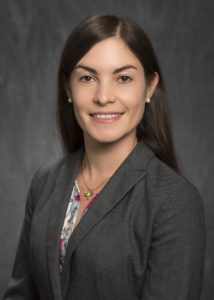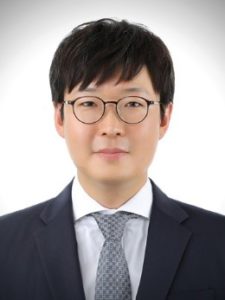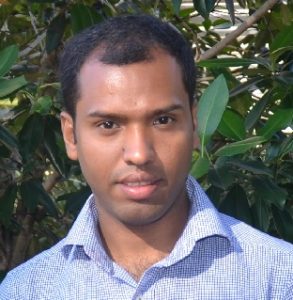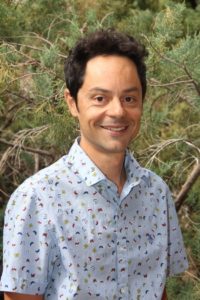 Noémie Elgrishi is an assistant professor in the Chemistry Department at Louisiana State University. She began her higher education in Paris at École Normale Supérieure and Université Pierre et Marie Curie – Paris VI. During her Master’s degree she studied host-guest chemistry with Johnathan Nitschke at the University of Cambridge and energy storage with Daniel Nocera at the Massachusetts Institute of Technology. Next, she completed her PhD on electrocatalytic reduction of carbon dioxide under the guidance of Marc Fontecave in Collège de France in Paris. She then pursued postdoctoral studies under the mentorship of Jillian Dempsey at UNC-Chapel Hill, which focused on mechanistic investigations of proton-coupled electron transfer (PCET) processes.
Noémie Elgrishi is an assistant professor in the Chemistry Department at Louisiana State University. She began her higher education in Paris at École Normale Supérieure and Université Pierre et Marie Curie – Paris VI. During her Master’s degree she studied host-guest chemistry with Johnathan Nitschke at the University of Cambridge and energy storage with Daniel Nocera at the Massachusetts Institute of Technology. Next, she completed her PhD on electrocatalytic reduction of carbon dioxide under the guidance of Marc Fontecave in Collège de France in Paris. She then pursued postdoctoral studies under the mentorship of Jillian Dempsey at UNC-Chapel Hill, which focused on mechanistic investigations of proton-coupled electron transfer (PCET) processes.
Read her Emerging Investigator article “Carbon Electrodes are Effective for the Detection and Reduction of Hexavalent Chromium in Water” and read more about her in the interview below:
Your recent Emerging Investigator Series paper focuses on Carbon Electrodes for the Detection and Reduction of Hexavalent Chromium in Water. How has your research evolved from your first article to this most recent article?
My background is in chemistry for environmental and energy-related challenges. A key aspect of the research is focused on understanding the fundamental processes that underpin the key transformations. These transformations all rely on the movement of protons and electrons in either a stepwise or concerted fashion. These processes are, for example, central to the chemistry of catalytic mechanisms for energy storage. My first paper as a first author was on photocatalytic H-X splitting with a focus on enhancing the stability of catalysts. This work was in the lab of Dan Nocera, at MIT at the time. This theme stayed with me throughout my PhD in Paris with Marc Fontecave. I was then exploring the mechanism of simple complexes for electrocatalytic reduction of carbon dioxide. The focus was on strategies to both control the competition between the production of hydrogen and of carbon containing fuels and orient the stability of the catalysts. These reactions all rely on understanding the detailed mechanisms of the chemical transformation, in particular the movements of protons and electrons (Proton Coupled electron transfer, or PCET). I continued this thread as a postdoctoral researcher at UNC-Chapel Hill under the mentorship of Jillian Dempsey.
It occurred to me that PCET reactions are central to much more than energy storage. As I started my independent career, I decided to expand beyond 2-electron/2-proton processes and explore how these reactions could impact the chemistry of oxyanions, in particular for water purification. This led me to study the electrochemistry of hexavalent chromium in water, as the fundamental challenge is the reduction of Cr(VI) to Cr(III) in an energy efficient manner. This relies on facilitating the movement of protons and electrons in PCET transformations. In this new paper, my group explores the reactivity in the absence of catalysts, and demonstrates that carbon electrodes are effective for both the detection and the reduction of Cr(VI). We identify a key rate limiting PCET step across a wide range of conditions, and we are looking forward to developing catalysts for these transformations.
What aspect of your work are you most excited about at the moment?
My lab currently focuses on several projects related to energy and the environment. Parts of my lab are exploring how to use confinement of molecular catalysts to improve stability for sustainability. We are also exploring ways to encapsulate and selectively degrade emerging contaminants, as well as how solvent interactions shape the properties of ions in solution. All these projects rely on understanding PCET and non-covalent interactions.
For water purification, I am excited to explore electrochemical methods to control PCET processes in the reduction or oxidation of oxyanions. Oxyanions are a large class of polyatomic ions which impact our water. We can think of nitrite, nitrates, phosphate, sulfate from agriculture for example, or arsenate, pertechnetate, and, of course, chromate.
In your opinion, what are the most important questions to be asked/answered in this field of research?
I truly believe that to advance beyond making observations of higher efficacy/activity/selectivity, we need to focus on understanding the mechanisms of underlying transformation. In particular, for hexavalent chromium reduction in water, I believe that understanding the mechanisms of the PCET processes involved is the key to cheaper and more effective water purification technologies. Shifting away from a concern about IF things happen and towards HOW things happen is a difficult but exciting task! In general, I think recognizing the strong influence of acid specificity, beyond simply the solution pH, will have a huge impact of the understanding of PCET in water.
The understanding of the fundamental steps will allow the development of catalysts for these transformations, mimicking the development of energy storing catalytic cycles, with a goal of highly active, selective and long-lasting catalysts for functionalized electrodes.
What do you find most challenging about your research?
When considering the chemistry of oxyanions in water, especially for chromate, the speciation is highly sensitive to conditions. This leads to challenges in measuring accurate thermodynamic data. As a result, a lot of the fundamental numbers and constants are not yet fully fixed in the literature.
In which upcoming conferences or events may our readers meet you?
This is a tough one with Covid-19. If the conferences are not cancelled, I will be at the Fall ACS in San Francisco in August 2020 as part of the GSSPC symposium Pushing the Boundaries: Women Scientists Catalyzing Change. I am also looking forward to the 2020 Joint SE-SW Regional Meeting of the American Chemical Society in New Orleans in October where I will be organizing a symposium on Energy and the Environment. Whether or not the current situation is under control enough for these conferences to meet in safe conditions is another question!
How do you spend your spare time?
I spend time cooking and I enjoy walking. The LSU campus is fantastic for walking, and I am still amazed by the wonderful live oak trees everywhere.
Which profession would you choose if you were not a scientist?
It is hard to imagine a career not related to science at all. I used to really enjoy learning new languages, so probably a translator.
Can you share one piece of career-related advice or wisdom with other early career scientists?
Read broadly and attend talks/seminars outside your field. It helps to make new connections between ideas and gain new perspectives.
 Seungdae Oh is an assistant professor in the Department of Civil Engineering at Kyung Hee University. Prior to joining KHU, he was an assistant professor (2015–2017) in the School of Civil and Environmental Engineering at Nanyang Technological University in Singapore and a postdoctoral research associate at University of Illinois at Urbana-Champaign. He received his PhD from Georgia Institute of Technology, after obtaining his BS from Chung Ang University and MS from KAIST in Korea, respectively.
Seungdae Oh is an assistant professor in the Department of Civil Engineering at Kyung Hee University. Prior to joining KHU, he was an assistant professor (2015–2017) in the School of Civil and Environmental Engineering at Nanyang Technological University in Singapore and a postdoctoral research associate at University of Illinois at Urbana-Champaign. He received his PhD from Georgia Institute of Technology, after obtaining his BS from Chung Ang University and MS from KAIST in Korea, respectively.












